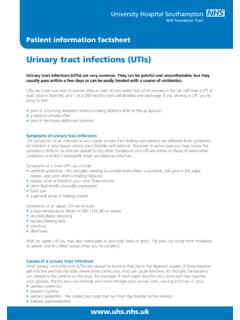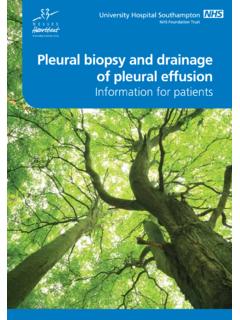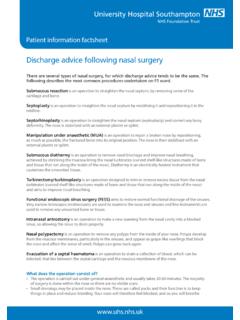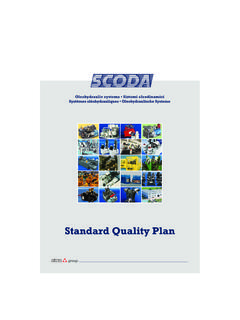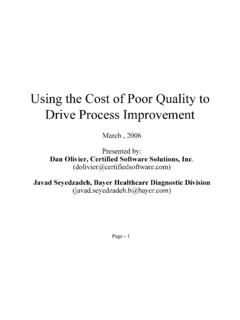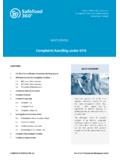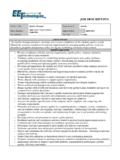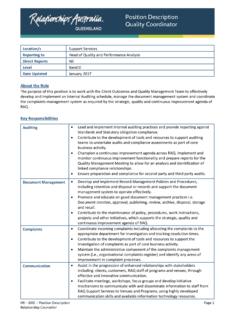Transcription of Concerns and complaints policy and procedures - …
1 Page 1 policy for handling Concerns and complaints Version: Authorisation Committee: Patient Experience & Engagement Steering Group Date of Authorisation: 16 October 2014 Ratification Committee: Quality Governance Steering Group Date of Ratification 16 October 2014 Signature of ratifying Committee Group/Chair Director of Nursing Lead Job Title of originator/author: Head of Patient Support Services Name of responsible committee/individual Patient Experience & Engagement Steering Group Date issued: 21 October 2014 Review date: 21 October 2017 Target audience: All Trust staff Key words Early resolution. Concern. Complaint. Remedy. Complaint advocacy (Healthwatch). Key changes: Clarification of roles and responsibilities (Appendix B & J) Framework to support investigation planning and cascade (Appendix G) Reporting arrangements for the monitoring of decision-making and payments of financial remedy offered to complainants ( ) A completed action plan will be requested for all upheld/partially upheld complaints (Appendix M) Care Group complaints handling performance dashboard (Appendix N) Quarterly report learning from Concerns and complaints will incorporate action plans for upheld/partially upheld complaints ; action plans developed in response to thematic analysis; lessons for dissemination across the organisation & evaluation of lessons learnt (Appendix O).
2 Main areas affected Whole organisation Consultation: PEESG members. Improving complaint handling Task & Finish Group members. HGOD members. Equality Impact Assessments completed and policy promotes Equity 6 October 2014 Page 2 Number of pages: 20 The Trust strives to ensure equality of opportunity for all, both as a major employer and as a provider of health care. This Concerns and complaints policy and procedures has therefore been equality impact assessed by the Patient Experience Steering Group to ensure fairness and consistency for all those covered by it, regardless of their individual differences, and the results are shown in Appendix A. Page 3 CONTENTS Executive Summary 5 1. Introduction 5 Scope Purpose Definitions Related Trust Policies 2. Roles & Responsibilities 8 3. Raising a concern or making a complaint 10 Information about raising a concern or making a complaint How to raise a concern or make a complaint Who may raise a concern or make a complaint Consent if the complainant is not the patient Concerns & complaints excluded from the scope of this policy Specific considerations when dealing with Concerns and complaints Time limit for making a complaint Handling of joint complaints between organisations 4.
3 Listening & responding to Concerns / complaints 14 Stage 1: Local resolution Stage 2: Parliamentary & Health Service Ombudsman 5. Local resolution 15 Complaint assessment and acknowledgement Complaint investigation planning Complaint investigation Remedy Complaint response Reinvestigation of complaints 6. Confidentiality & record keeping 17 7. Support for complainant & staff 18 8. Harassment & vexatious/intractable complainants 18 9. Improving as a result of Concerns & complaints 19 10. Implementation 20 11. Process for monitoring compliance/effectiveness 20 12. Arrangements for review of the policy 20 Page 4 Appendices A: Equality Impact Assessment B: Role & responsibilities: CGM, Complaint Lead; Complaint Investigation Contributor C: Protocol for the handling of inter-organisational complaints D: Procedure for dealing with complaints involving a third party independent provider E: Procedure for early local resolution F: Complaint assessment tool G: Procedure for complaint assessment & acknowledgement H: Framework to support investigation planning & cascade I: Procedure for complaint investigation J: Summary of role & responsibilities of Care Group/Division Complaint Lead & PSS Complaint Handler K: Procedure for responding to a complaint L: Procedure for handling vexatious or intractable complaints M: Complaint action plan N: Complaint handling performance report O: Report: learning from Concerns & complaints P.
4 Audit tool to monitor policy compliance Page 5 The purpose of this policy is to explain how University Hospital Southampton NHS Foundation Trust (UHS) implements the statutory legal framework for the Local Authority and National Health Service complaints (England) Regulations 2009, and meets the requirements of the NHS Constitution. The policy makes clear what people should expect when they complain (NHS Constitution) and supports a culture of openness, honesty and transparency (Duty of Candour). Trust practice is informed by the Parliamentary and Health Services (PHSO) good complaint handling guidance and principles of remedy; and key recommendations and messages from the Francis and Clwyd & Hart reports. In most circumstances the quickest and most effective way of resolving a concern or complaint is to deal with the issues when they arise or as soon as possible after this (early local resolution). Usually this is best undertaken as close to the point of care / service delivery as possible.
5 In circumstances where early local resolution is not possible, this policy describes the processes in place to ensure Concerns and complaints are handled efficiently and investigated thoroughly. The policy clarifies the roles and responsibilities of Trust staff in assessing, acknowledging and investigating Concerns or complaints and ensures that the complainant is listened to, is involved in decisions about how their concern or complaint is handled and receives an open, honest and proportionate response to their complaint. The policy promotes the use of people s experience of care to improve quality. By listening to people about their experience of healthcare, the Trust can resolve mistakes faster, learn new ways to improve the quality and safety of services and prevent the same problem from happening in the future. The reporting and monitoring of trends, themes and lessons learnt is undertaken through Divisional Governance Structures, Patient Experience & Engagement Steering Group and the Quality Governance Steering Group, used to ensure compliance with commissioner, regulatory and good practice requirements.
6 INTRODUCTION The Trust welcomes feedback from patients and the public about the services we provide. A range of methods are used to encourage users to share their experiences and this includes feedback from Concerns , comments, complaints and compliments. The Trust is committed to providing safe, effective and high quality services. However, it is recognised that at times things can go wrong. When Concerns or complaints are raised, the Trust has a responsibility to acknowledge the concern or complaint, put things right as quickly as possible, to learn lessons, prevent reoccurrence and identify service improvements. In most circumstances the quickest and most effective way of resolving a concern or complaint is to deal with the issues when they arise or as soon as possible after this (early local resolution). Usually this is best undertaken as close to the point of care / service delivery as possible. Page 6 In circumstances where early local resolution is not possible, Patient Support Services (PSS) are responsible for the overall management of Concerns and complaints .
7 PSS integrates the complaint handling and Patient Advice and Liaison Service (PALS) functions, combining to provide a flexible approach to resolving peoples Concerns and complaints . Scope The policy deals with the handling of Concerns and complaints regarding Trust services, buildings or the environment. Concerns and complaints may be received from patients; patient relatives, carers, visitors and other service users. The Concerns and complaints excluded from the scope of this policy are identified in section The policy applies to all sites, departments and areas within the organisation; and applies to all permanent and temporary staff working within the Trust. Purpose The purpose of this policy is to explain how UHS implements the statutory legal framework for the Local Authority and National Health Service complaints (England) Regulations 2009, meets the requirements of the NHS Constitution and Duty of Candour, and ensures compliance with commissioner, regulatory and good practice requirements.
8 The policy makes clear what people should expect when they complain (NHS Constitution) and supports a culture of openness, honesty and transparency (Duty of Candour). Trust practice is informed by the Parliamentary and Health Services (PHSO) good complaint handling guidance and principles of remedy; and key recommendations and messages from the Francis and Clwyd & Hart reports. The aims and outcomes of this policy promote early, local and prompt resolution, involving the complainant in deciding how their Concerns are handled. Likewise, good complaint handling and continuous learning is endorsed throughout the policy , promoting improvements in the quality and safety of services at UHS and facilitating positive patient experiences. Aims 1. To listen, to acknowledge mistakes, explain what went wrong and to consider prompt, appropriate and proportionate remedies to put things right. 2. To provide a consistent approach to the timely and efficient handling of all Concerns and complaints , establishing an agreed complaints plan with the complainant, with an emphasis on early resolution.
9 3. Ensure organisational openness and an approach that is conciliatory and fair to people both using and delivering services. 4. Respect the individual s right to confidentiality and treat all users of this policy with respect and courtesy. 5. Learn from Concerns and complaints and use them to improve the quality of services and to prevent mistakes happening again. Outcomes a) The policy & procedure will, as far as is reasonably practical, be easy to understand, accessible, publicised in ways that will reach all service users and include information about support and advocacy services. Page 7 b) All staff will receive an appropriate level of training to enable them to respond positively to Concerns and complaints , and endeavour to resolve issues quickly. c) The Trust will ensure that service users and carers can raise a concern or complaint without their care, treatment or relationship with staff being compromised. d) All Concerns and complaints will be acknowledged within 3 working days.
10 Where possible the complaint issues will be clarified, investigation timescale agreed with the complainant, and the best way to reach a satisfactory outcome discussed. e) Investigations will be thorough, responsive and appropriate to the seriousness of the complaint, conducted within the timescales agreed with the complainant. f) The format of the response to the concern/complaint will be agreed with the complainant, this may be verbal (by phone or at a meeting), by email or written letter. Often, a concern can be satisfied with a verbal response. complaints will require a written response, although some complainants prefer to receive this via email. The response will explain how the complaint has been investigated, apologising where appropriate, explain the outcome of the investigation, what actions have been/will be taken and what the next steps are for the complainant if they remain dissatisfied. g) The Trust will strive to resolve all complaints locally, whilst reminding people of their right to take the matter to the Health Service Ombudsman if they are not satisfied.



